Hong Kong leader urges calm as protest tensions rise; airport reopens
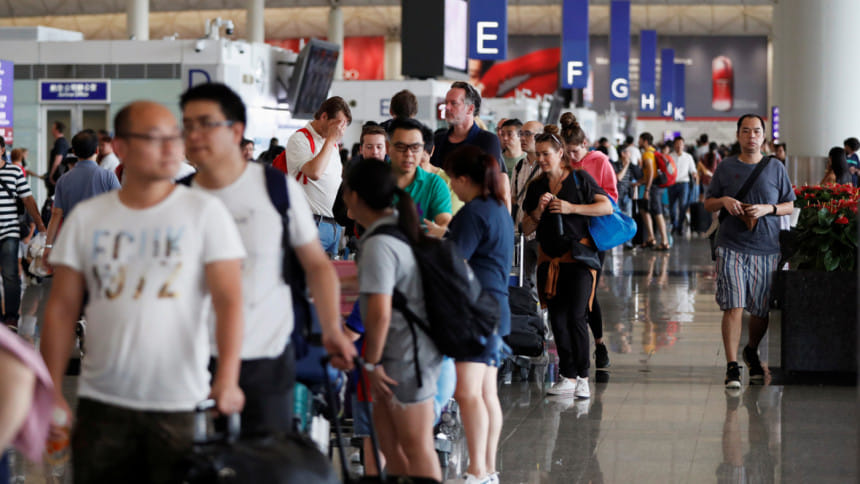
-- Hong Kong airport reopens after days of protests
-- Airport administrator says flight movements will be affected
-- Shutdown was blamed on anti-government protesters
-- Cathay Pacific cancels more than 200 flights on Tuesday
-- Protests post major challenge to Hong Kong and Chinese rule
Hong Kong leader Carrie Lam said on Tuesday the city’s recovery from protests that have swept the Asian financial hub could take a long time and that she would be responsible for rebuilding its economy “after the violence eases”.
Her comments followed serious developments in the growing crisis over the past week. Beijing said on Monday the protests had begun to show “sprouts of terrorism”, and the city’s airport was closed in an unprecedented move that forced hundreds of flight cancellations.
As she spoke to reporters, her voice cracking with emotion at one point, Hong Kong’s Hang Seng index fell by more than 1 per cent to its lowest level since January 4. The index was down around 1.5 per cent soon after.
She said violence by protesters had pushed Hong Kong into “a state of panic and chaos”.
“Hong Kong, as an open, free, very tolerant, economically stable city will see severe wounds ... The recovery may take a long time,” she said.
The increasingly violent demonstrations have plunged the Chinese-ruled territory into its most serious crisis in decades, presenting Chinese leader Xi Jinping with one of his biggest challenges since he came to power in 2012.
The protests began as opposition to a now-suspended bill that would have allowed extradition to mainland China for those facing criminal charges but have grown into wider calls for democracy.
Demonstrators say they are fighting the erosion of the “one country, two systems” arrangement enshrining some autonomy for Hong Kong when China took it back from Britain in 1997.
They also say police have used excessive force, firing tear gas and bean bag pellets at close range, and are calling for an independent inquiry into the crisis.
“I ask everybody to put aside our differences and calm down, take a minute to look at our city, our home. Can we bear to push it into the abyss and see it smashed to pieces?” said Lam.
The protesters have called for Lam’s resignation.
CRITICAL JUNCTURE
China said on Monday the protests had reached a critical juncture.
‘Protesters have been frequently using extremely dangerous tools to attack the police in recent days, constituting serious crimes with sprouts of terrorism emerging,” Hong Kong and Macau Affairs office spokesman Yang Guang said in Beijing.
Some Hong Kong legal experts say the official description of terrorism could lead to the use of anti-terror laws.
Hong Kong’s airport reopened on Tuesday with some flight resumptions but hundreds of others were still cancelled, with airlines such as Vietnam Airlines, Jetstar Pacific and Malaysian Airlines advising travellers of rescheduling.
The airport was the latest focus of protests that began two months ago.
Its administrator blamed demonstrators for halting flights on Monday but the exact trigger for the closure was not clear because protesters occupying the arrivals hall for the past five days have been peaceful.
Most protesters had left the airport shortly after midnight, with about 50 protesters still there on Tuesday morning. Hong Kong's airport is the eighth busiest by passenger traffic, handling 73 million passengers a year.
Hong Kong flag carrier Cathay Pacific said on its website it had cancelled more than 200 flights into and out of the airport on Tuesday and that it would only operate a limited number of flights for connecting passengers.
Shares in Cathay, which fell to a 10-year-low on Monday, continued their slide on Tuesday and were down more than 4.5 per cent in morning trading.
The company is caught in crosswinds between Beijing and pro-democracy groups in Hong Kong after the Chinese civil aviation regulator demanded it suspend personnel who engaged in or supported the protests from staffing flights into its airspace.
The closure of the airport added to that pressure. A Reuters reporter saw more than 100 travellers queuing up at Cathay’s ticketing counter early on Tuesday.
Kate Flannery, an Australian traveller heading for Paris, said the handling of the protests appeared chaotic on Monday night.
“The airport authority didn’t deal with the situation,” she said. “I felt like I was walking around and nobody gave us information.”
A Cathay customer officer at the airport, who declined to provide his name, said nearly all the airline’s flights were full.
“It is possible that the airport authority will cancel more flights as they need to control the air traffic movements at the Hong Kong International Airport,” he said.

 For all latest news, follow The Daily Star's Google News channel.
For all latest news, follow The Daily Star's Google News channel. 

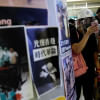
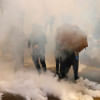
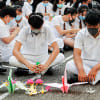
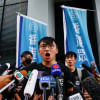


Comments